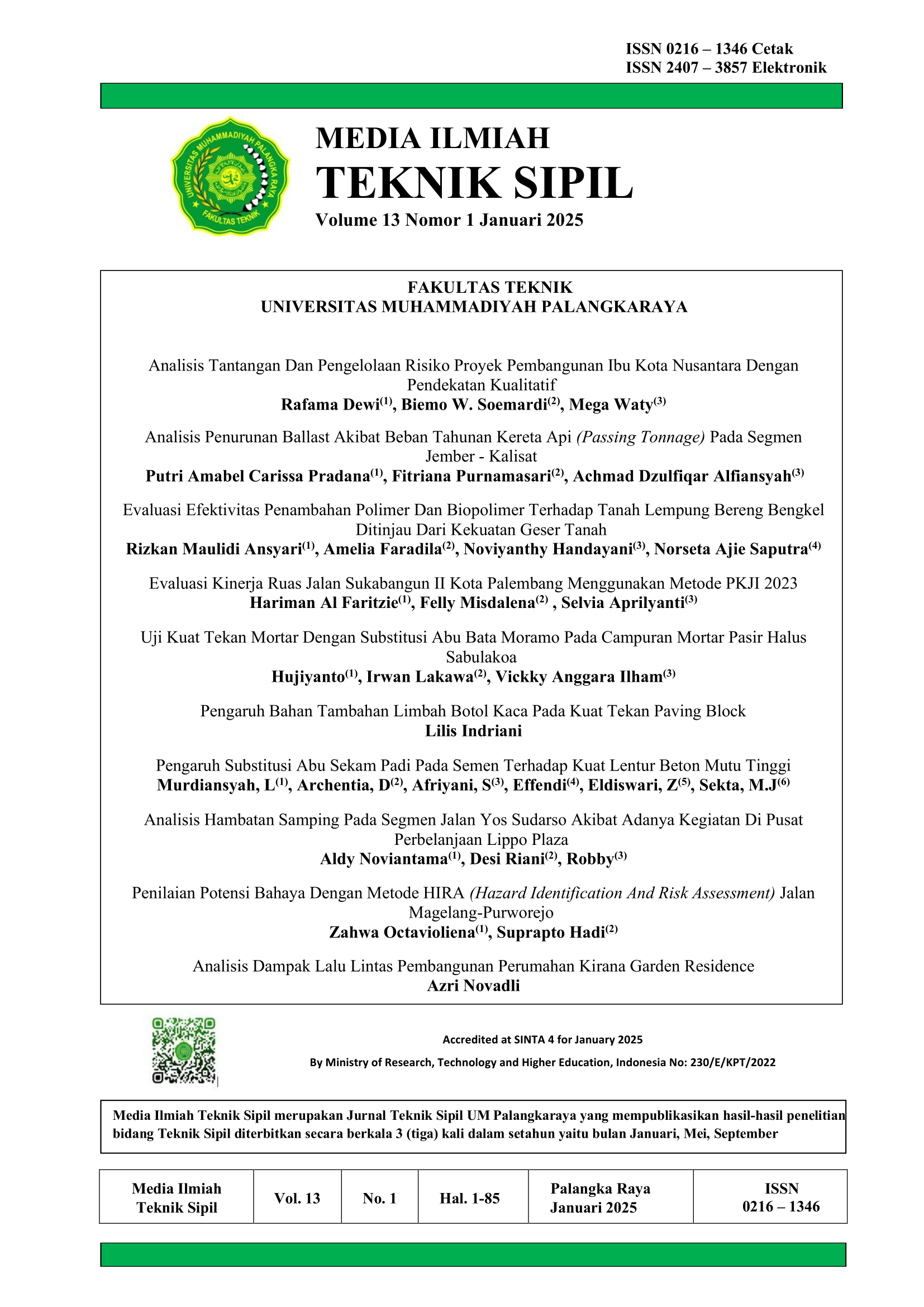Evaluasi Efektivitas Penambahan Polimer Dan Biopolimer Terhadap Tanah Lempung Bereng Bengkel Ditinjau Dari Kekuatan Geser Tanah
Evaluation Of The Effectiveness Of Polymer And Biopolymer Additives On Clay In Terms Of Soil Shear Strength
Abstract
Clay soil has high plasticity and low shear strength characteristics, making it a challenge in construction projects, especially in areas with high water content, such as Bereng Bengkel District, Palangkaraya City. To address this issue, polymers and biopolymers have been used as stabilization materials to enhance the shear strength of the soil. This study aims to evaluate the effect of adding polymers and biopolymers on the mechanical parameters of clay soil, particularly cohesion (CC) and internal friction angle (ϕ). Laboratory experiments were conducted following SNI 2825:2015 standards for direct shear testing. Clay soil samples were collected from Bereng Bengkel and mixed with polymer (polyacrylamide) and biopolymer (xanthan gum) at concentrations of 0.5%, 1.0%, 1.5%, and 2.0%. Shear strength parameters were analyzed to determine the effectiveness of each stabilization material, with the optimal concentration determined based on maximum cohesion and internal friction angle values. The results showed that the addition of polymer could increase cohesion by up to 70% and the internal friction angle by up to 130% at concentrations of 1.0% to 1.5%, while biopolymers could increase cohesion by up to 39% and the internal friction angle by up to 313% at concentrations of 1.0% to 2%, compared to the initial values. These findings indicate that soil stabilization with polymers and biopolymers significantly improves the shear strength of Bereng Bengkel soil.
The study concludes that the optimal combination of stabilization materials can significantly enhance the mechanical properties of clay soil and opens opportunities for further research with other additive materials such as lime or cement.
Downloads
References
Badan Standardisasi Nasional. (2015). SNI 2825:2015 - Metode uji kuat geser tanah dengan alat geser langsung. Jakarta: Badan Standardisasi Nasional.
Badan Standardisasi Nasional. (2015). SNI 6425:2015 - Metode uji kuat geser tanah dengan alat triaxial. Jakarta: Badan Standardisasi Nasional.
Lestari, R., & Widjaja, P. (2022). Analisis mekanisme stabilisasi tanah menggunakan biopolymer ramah lingkungan. Jurnal Rekayasa Infrastruktur, 7(1), 45-57. https://doi.org/10.xxxx/jri.v7i1.98765
Putra, B., & Lestari, D. (2023). Pengaruh penggunaan biopolymer terhadap stabilisasi tanah lempung: Studi kasus pada tanah lokal Indonesia. Jurnal Geoteknik dan Rekayasa Lingkungan, 15(2), 123-134. https://doi.org/10.xxxx/jgrl.v15i2.12345
Rahman, T., & Hakim, F. (2023). Stabilisasi tanah lempung dengan kombinasi polymer dan biopolymer. Jurnal Inovasi Teknik Sipil, 8(2), 78-89. https://doi.org/10.xxxx/jits.v8i2.45678
Santosa, H., & Wibowo, A. (2019). Perilaku pengembangan tanah lempung akibat fluktuasi kadar air. Jurnal Geoteknik Indonesia, 12(3), 167-180. https://doi.org/10.xxxx/jgi.v12i3.11223
Suryadi, M., & Hartono, A. (2021). Stabilisasi tanah menggunakan polymer: Studi eksperimental pada tanah dengan plastisitas tinggi. Jurnal Konstruksi dan Material, 12(4), 211-225. https://doi.org/10.xxxx/jkm.v12i4.12398
Wulandari, A., Nugraha, F., & Pratama, H. (2023). Efektivitas polimer poliakrilamida dalam meningkatkan daya dukung tanah lempung. Jurnal Teknik Sipil Indonesia, 10(3), 98-112. https://doi.org/10.xxxx/jtsi.v10i3.56789
Downloads
Published
How to Cite
Issue
Section
License
Copyright (c) 2025 Rizkan Maulidi Ansyari, Amelia Faradila, Noviyanthy Handayani, Norseta Ajie Saputra

This work is licensed under a Creative Commons Attribution-ShareAlike 4.0 International License.
All rights reserved. This publication may be reproduced, stored in a retrieval system, or transmitted in any form or by any means, electronic, mechanical, photocopying, recording.
